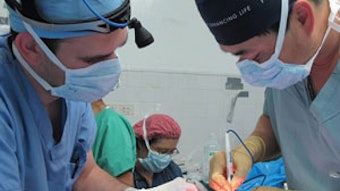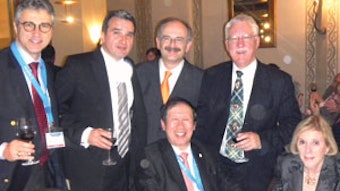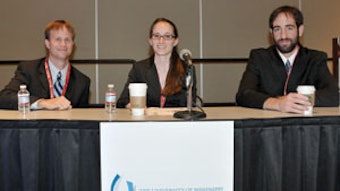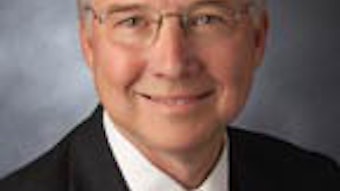“Choosing Wisely™”—Next Steps
David R. Nielsen, MD, AAO-HNS/F EVP/CEO A couple of months ago, I wrote about the Choosing Wisely™ campaign. There have been enthusiastic expressions of support from most otolaryngology societies and many of our committees. The national press has also shown interest in the leadership displayed by physicians and their organizations in improving patient care. Major publications, including The New York Times, The Washington Post, and Consumer Reports have published articles specifically about this movement, identifying the Academy as a participant. They have been predominantly complimentary in their assessments and editorials about the necessity for such leadership. One of the concerns faced by medical associations embarking on this initiative to improve quality care, and reduce waste and duplication is the potential for misperception by the public of the patients’ role in addressing it. While physicians and their associations are acknowledging the presence of waste and duplication in healthcare delivery, patient attitudes, expectations, compliance, and communication with their doctors are critical elements in improving quality. The Choosing Wisely™ campaign is not just about physicians prescribing and ordering tests or treatments. The campaign is designed to encourage conversations between physicians and their patients so accountability for the medical care being given, and the resources being used, is shared. The AMA-convened Physician Consortium for Performance Improvement (PCPI) recently asked me to represent them on the task force on shared accountability. This task force is being convened by the American College of Cardiology Foundation (ACCF), the National Committee for Quality Assurance (NCQA), the American Heart Association (AHA), the AMA-PCPI and several other medical associations and nonprofits. The goal of this group is to draft a white paper outlining the issues related to shared accountability for quality improvement, and to make recommendations for how patients and their caregivers can effectively collaborate. I believe this task force will address a number of issues. Naturally, physicians are faced with the responsibility of obtaining an accurate history, performing a physical examination, recommending justifiable and necessary tests, making a provisional diagnosis, and suggesting a course of action. Patients are responsible for sharing information physicians need in order to perform these functions. However, once recommendations are made for laboratory tests, imaging, or medical or surgical treatment, a host of additional concerns arises. Physician clinical experience and judgment, assessing the most effective use of resources, and patient compliance and adherence to a treatment regimen, are added to the mix. Just looking at adherence alone, we can further subdivide concerns into many other related issues that would influence shared accountability, even going beyond the physician and patient contributions. A brief list could include: Physician prescribing patterns Variations in or alternatives to recommended procedures Alternative medical interventions Performance measures or evidence-based guidelines Patient preferences, compliance, education, understanding, healthcare literacy, and acceptance Access to or availability of medications and ancillary care Lifestyle factors (diet, exercise, tobacco, alcohol, drug use, etc.) Each of these could be further affected by many other compliance concerns, including, but not limited to, out-of-pocket costs, insurance coverage, formulary policy, travel restrictions, family issues, and communication issues between the patient and the medical facility. During the last month, the Academy embarked on the methodology for determining the five clinical practice parameters we would like to address as a specialty to improve quality and reduce waste and unnecessary care. The Academy’s Patient Safety and Quality Improvement Committee (PSQI) has accepted responsibility for leading this initiative. The committee has extended a call to all otolaryngology societies through the Specialty Society Advisory Council to make recommendations to the PSQI. We have been gratified by the enthusiastic response and recommendations from several subspecialty societies, including the American Neurotology Society, the American Laryngological Association, the American Academy of Facial Plastic and Reconstructive Surgery, the American Rhinologic Society, the American Society of Pediatric Otolaryngology, and the American Otological Society. We have additional commitments from other societies and expect to have more submissions soon. I extend my thanks to you, our members, and to the many thoughtful specialty society leaders who are giving careful, continuous deliberation on how we as otolaryngologists can provide better care. In the words of Daniel B. Wolfson, the executive director of the American Board of Internal Medicine Foundation, in The Medical Professionalism Blog (blog.abimfoundation.org), “much like Paul Revere during the American Revolution, the specialty societies are the right messengers to lead this movement.”
David R. Nielsen, MD, AAO-HNS/F EVP/CEO
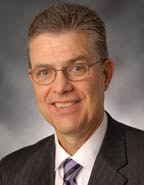 David R. Nielsen, MD, AAO-HNS/F EVP/CEO
David R. Nielsen, MD, AAO-HNS/F EVP/CEOA couple of months ago, I wrote about the Choosing Wisely™ campaign. There have been enthusiastic expressions of support from most otolaryngology societies and many of our committees. The national press has also shown interest in the leadership displayed by physicians and their organizations in improving patient care. Major publications, including The New York Times, The Washington Post, and Consumer Reports have published articles specifically about this movement, identifying the Academy as a participant. They have been predominantly complimentary in their assessments and editorials about the necessity for such leadership.
One of the concerns faced by medical associations embarking on this initiative to improve quality care, and reduce waste and duplication is the potential for misperception by the public of the patients’ role in addressing it. While physicians and their associations are acknowledging the presence of waste and duplication in healthcare delivery, patient attitudes, expectations, compliance, and communication with their doctors are critical elements in improving quality. The Choosing Wisely™ campaign is not just about physicians prescribing and ordering tests or treatments. The campaign is designed to encourage conversations between physicians and their patients so accountability for the medical care being given, and the resources being used, is shared.
The AMA-convened Physician Consortium for Performance Improvement (PCPI) recently asked me to represent them on the task force on shared accountability. This task force is being convened by the American College of Cardiology Foundation (ACCF), the National Committee for Quality Assurance (NCQA), the American Heart Association (AHA), the AMA-PCPI and several other medical associations and nonprofits. The goal of this group is to draft a white paper outlining the issues related to shared accountability for quality improvement, and to make recommendations for how patients and their caregivers can effectively collaborate.
I believe this task force will address a number of issues. Naturally, physicians are faced with the responsibility of obtaining an accurate history, performing a physical examination, recommending justifiable and necessary tests, making a provisional diagnosis, and suggesting a course of action. Patients are responsible for sharing information physicians need in order to perform these functions. However, once recommendations are made for laboratory tests, imaging, or medical or surgical treatment, a host of additional concerns arises. Physician clinical experience and judgment, assessing the most effective use of resources, and patient compliance and adherence to a treatment regimen, are added to the mix. Just looking at adherence alone, we can further subdivide concerns into many other related issues that would influence shared accountability, even going beyond the physician and patient contributions. A brief list could include:
- Physician prescribing patterns
- Variations in or alternatives to recommended procedures
- Alternative medical interventions
- Performance measures or evidence-based guidelines
- Patient preferences, compliance, education, understanding, healthcare literacy, and acceptance
- Access to or availability of medications and ancillary care
- Lifestyle factors (diet, exercise, tobacco, alcohol, drug use, etc.)
Each of these could be further affected by many other compliance concerns, including, but not limited to, out-of-pocket costs, insurance coverage, formulary policy, travel restrictions, family issues, and communication issues between the patient and the medical facility.
During the last month, the Academy embarked on the methodology for determining the five clinical practice parameters we would like to address as a specialty to improve quality and reduce waste and unnecessary care. The Academy’s Patient Safety and Quality Improvement Committee (PSQI) has accepted responsibility for leading this initiative. The committee has extended a call to all otolaryngology societies through the Specialty Society Advisory Council to make recommendations to the PSQI. We have been gratified by the enthusiastic response and recommendations from several subspecialty societies, including the American Neurotology Society, the American Laryngological Association, the American Academy of Facial Plastic and Reconstructive Surgery, the American Rhinologic Society, the American Society of Pediatric Otolaryngology, and the American Otological Society. We have additional commitments from other societies and expect to have more submissions soon.
I extend my thanks to you, our members, and to the many thoughtful specialty society leaders who are giving careful, continuous deliberation on how we as otolaryngologists can provide better care. In the words of Daniel B. Wolfson, the executive director of the American Board of Internal Medicine Foundation, in The Medical Professionalism Blog (blog.abimfoundation.org), “much like Paul Revere during the American Revolution, the specialty societies are the right messengers to lead this movement.”
